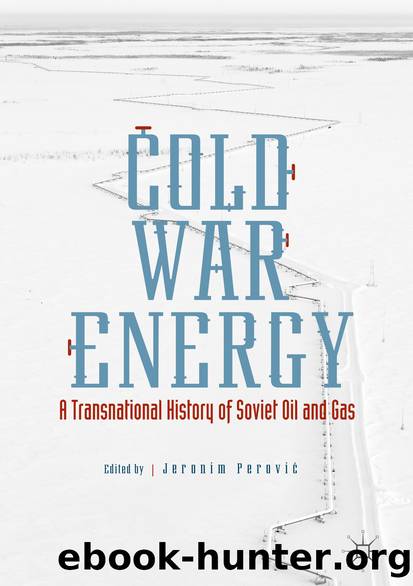Cold War Energy by Jeronim Perović

Author:Jeronim Perović
Language: eng
Format: epub
Publisher: Springer International Publishing, Cham
Italy’s Challenge to the “Seven Sisters”
As a country that lacks natural resources, Italy’s national history has been characterized by a constant effort to develop autonomous sources of energy, by building hydroelectric power plants, and by searching for hydrocarbons at home and abroad. The Fascist regime made the achievement of Italy’s energy independence from abroad part and parcel of its political and economic program through the establishment of the state-owned company Azienda Generale Italiana Petroli (General Italian Oil Company, AGIP). During World War II, most of AGIP’s refineries, pipelines, and drilling equipment were either destroyed or heavily damaged. With the landing of the Allies in Sicily in the summer of 1943 and the division of Italy into two parts, the country’s provisional government, with the support of the US, the UK, and international oil companies, promoted the liquidation of AGIP. Their main concern was that a state-owned oil company might hinder the economic interests of foreign oil firms operating in Italy, as it had done in the interwar period and during the war, when their properties had been nationalized. As a result of these pressures, in 1945 AGIP reopened its offices in Rome under the direction of Arnaldo Petretti, who reassured the Allies that the company would not pursue an autarkic policy but rather become fully integrated in the international economy. According to the US administration, as well as American oil companies, Italy—like other West European countries—was to become a market for the oil US firms extracted in the Middle East. Using American economic aid and technology, it was supposed to substitute oil for coal as the main source of its industrial production, thereby becoming dependent on a resource controlled by the US. At the same time, its position at the center of the Mediterranean would secure Italy the role of “Europe’s refinery,” transforming the country into a crucial link between oil producers and oil consumers in an international market largely dominated by the so-called “Seven Sisters.” 6
As the war was coming to an end, however, the Central Economic Commission of the Comitato di Liberazione Nazionale Alta Italia (National Committee for the Liberation of Northern Italy), an organization invested with the powers of government in the northern part of Italy, nominated Enrico Mattei as special administrator of AGIP Alta Italia with the task of supervising the company’s activities in the region. The Central Commission’s choice was not fortuitous: Mattei was close to Milan’s industrial world and was well known for his economic and financial abilities. In 1946, he was among the founders of the Democrazia Cristiana (Christian Democratic Party, DC) and, with the support of the so-called “left-wing DC,” convinced the Italian government that AGIP should remain a state-owned company, promote Italy’s economic reconstruction, and ensure the country’s autonomy from US and British oil companies by extracting oil and natural gas in Italy. In 1953, after several years of intense debate, the Italian government incorporated AGIP into ENI. The new agency drew together a wide number of state-owned entities into a single holding and provided Mattei with a basis for expansion across Italy and beyond.
Download
This site does not store any files on its server. We only index and link to content provided by other sites. Please contact the content providers to delete copyright contents if any and email us, we'll remove relevant links or contents immediately.
Life 3.0: Being Human in the Age of Artificial Intelligence by Tegmark Max(5532)
The Sports Rules Book by Human Kinetics(4365)
The Age of Surveillance Capitalism by Shoshana Zuboff(4264)
ACT Math For Dummies by Zegarelli Mark(4033)
Unlabel: Selling You Without Selling Out by Marc Ecko(3637)
Blood, Sweat, and Pixels by Jason Schreier(3595)
Hidden Persuasion: 33 psychological influence techniques in advertising by Marc Andrews & Matthijs van Leeuwen & Rick van Baaren(3535)
The Pixar Touch by David A. Price(3412)
Bad Pharma by Ben Goldacre(3410)
Urban Outlaw by Magnus Walker(3377)
Project Animal Farm: An Accidental Journey into the Secret World of Farming and the Truth About Our Food by Sonia Faruqi(3206)
Kitchen confidential by Anthony Bourdain(3069)
Brotopia by Emily Chang(3035)
Slugfest by Reed Tucker(2987)
The Content Trap by Bharat Anand(2906)
The Airbnb Story by Leigh Gallagher(2833)
Coffee for One by KJ Fallon(2615)
Smuggler's Cove: Exotic Cocktails, Rum, and the Cult of Tiki by Martin Cate & Rebecca Cate(2508)
Beer is proof God loves us by Charles W. Bamforth(2434)
